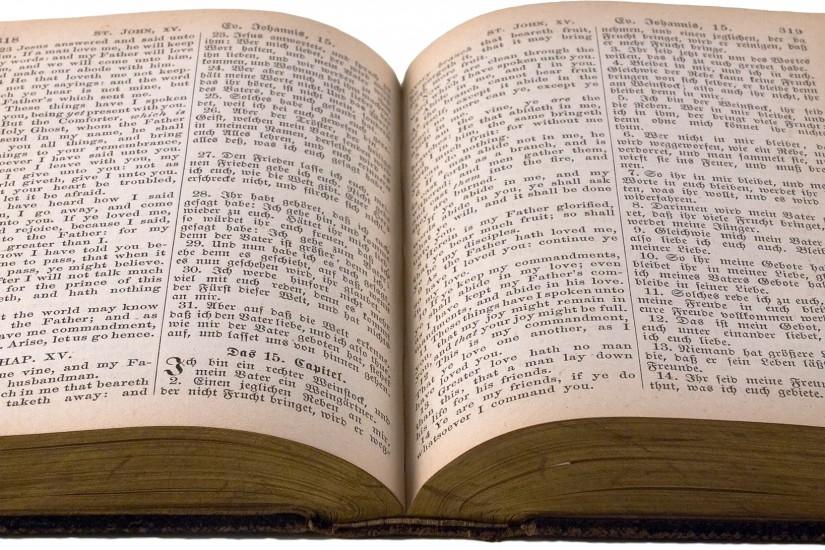“Hatred stirreth up strifes: but love covereth all sins.”
The second half of this verse is a concept that is often found in scripture. It is found in 1 Corinthians 13, the chapter about love. In verse 5 we read that love, “… thinketh no evil;”, which could be translated, “…doesn’t account evils done…” This fits with the last part of Proverbs 10:12. Imagine a relationship in which partners kept track of offences that were done by each other. How long would that relationship last? The more extreme an offence may be, the harder it may be to be forgiving of them. But, according to the verse above, love covers all sins.
One way to look at 1 Corinthians 13 is to consider that this is how God loves us! Verses 4-8 say, “Charity (love) suffereth long, and is kind; charity envieth not; charity vaunteth not itself, is not puffed up, doth not behave itself unseemly, seeketh not her own, is not easily provoked, thinketh no evil; rejoiceth not in iniquity, but rejoiceth in the truth; beareth all things, believeth all things, hopeth all things, endureth all things. Charity never faileth:”. Think about each of these aspects of love from the perspective that it is how God loves us. To sum up, love covers all sins: all of our sins, great and small.
But, at the same time our sins are an offense to God. He has said that the soul that sins shall die (Ezekiel 18:20). It is impossible for God to lie (Hebrews 6:18), so what He says is the truth. God’s justice must be satisfied, too. It might seem that God has Himself painted into a corner. On one hand the Bible tells us that God is love (1 John 4:8). And on the other hand, we know that He must judge our sin. His justice must be satisfied.
His solution to the problem is the sacrifice of Jesus Christ. Jesus paid the sentence of death on our behalf so that God’s justice would be satisfied. His sacrifice was enough to cover all sin for all time. Not everyone believes that they need to be reconciled with God this way. They think they can satisfy God with their own good works. They also believe that what they do will make them right with God, and will give them access into God’s presence. But, if that could reconcile us with God, why did Jesus have to die?
Other scriptures reveal God’s love and care for His people, as described in Proverbs 10:12. His love covers a multitude of sins on the basis of the sacrifice of Jesus Christ.
In 2 Samuel 11 and 12 we read about David’s sins against Bathsheba and her husband. David was guilty of adultery and murder. The Lord sent Nathan the prophet to David to reveal to him that the Lord knew what he had done. In 2 Samuel 12:13 we read, “And David said unto Nathan, I have sinned against the LORD. And Nathan said unto David, The LORD also hath put away thy sin; thou shalt not die.” David admitted his sin, and Nathan gave him the astounding news that God had put away David’s sin. Isn’t it wonderful to see how God cares for His people? God’s love covered David’s sin on the basis of the sacrifice of Christ: God’s love covers all sins!
In Jeremiah chapters 1 to 45 we read about Israel rejecting God. Instead, they worshipped the idols of the nations around them. Time and again He appealed to them to leave their idols and follow Him instead, and they refused Him. And, He warned them about judgment for their idolatry. But, in chapters 46-52, God promised to restore them to Himself, describing what His blessing will look like, and judge the nations around them. In Jeremiah 50:20 we read, “In those days, and in that time, saith the LORD, the iniquity of Israel shall be sought for, and there shall be none; and the sins of Judah, and they shall not be found: for I will pardon them whom I reserve.” The first 45 chapters list and reveal their sins. But in this verse, the Lord proposed that a search be made to discover the sins and iniquities of His people. He said that even though search would be made, their sins and iniquities would not be found; that there was nothing to find. Isn’t it wonderful to see God’s care for His people? God’s love covers all sins!
Zechariah 3 talks about a vision that Zechariah had of the high priest Joshua. In the vision, Joshua was standing before God. And, the enemy of our souls was standing at his right hand to accuse him. Since Joshua was in God’s presence, he had passed from this life, and was facing God at the end of his life. Is not it sobering to learn that the enemy of our souls was at that place while Joshua faced God, and was there to accuse him. Wonderfully, none of the words of the enemy are recorded. In Zechariah 3:2-4 we read, “And the LORD said unto Satan, The LORD rebuke thee, O Satan; even the LORD that hath chosen Jerusalem rebuke thee: is not this a brand plucked out of the fire? Now Joshua was clothed with filthy garments, and stood before the angel. And he answered and spake unto those that stood before him, saying, Take away the filthy garments from him. And unto him he said, Behold, I have caused thine iniquity to pass from thee, and I will clothe thee with change of raiment.” See what God had done for Joshua? He gave him change of clothing, making him fit to stand in His presence, and He caused his iniquity to pass from him! Isn’t wonderful to see how God cares for His people? God’s love covers all sins!
For those that have Jesus Christ as their savior, the same words apply. He has caused our sins and iniquities to pass from us, His love covers all sins. Until we are in His presence, we will have struggles with sin, as Paul expressed in Romans 7:15-24, but our standing before God is unchanged. In Romans 8:1 Paul said, “There is therefore now no condemnation to them which are in Christ Jesus, who walk not after the flesh, but after the Spirit.” And scripture is clear that God lives in us, guiding us into all truth and giving us the ability we need to live lives that please Him. Isn’t it wonderful to see how God cares for His people? His love covers all sins.
All who reject the sacrifice of Christ remain under God’s wrath for their sin. Consider the awful price He paid to reconcile mankind with Himself. God died for us. What more would someone want Him to do? As Romans 5:8 says, “But God commendeth his love toward us, in that, while we were yet sinners, Christ died for us.” His love covers all sins.
Gone is all my debt of sin,
A great change is wrought within,
And to live I now begin,
Risen from the fall;
Yet the debt I did not pay—
Someone died for me one day,
Sweeping all the debt away—
Jesus paid it all.
Refrain
Jesus died and paid it all, yes,
On the cross of Calvary, Oh
And my stony heart was melted
At His dying, dying call;
Oh, His heart in shame was broken
On the tree for you and me, yes,
And the debt, the debt is canceled,
Jesus paid it, paid it all.
Oh, I hope to please Him now,
Light of joy is on my brow,
As at His dear feet I bow,
Safe within His love.
Making His the debt I owed,
Freedom true He has bestowed;
So I’m singing on the road
To my home above.
Refrain
Sinner, not for me alone
Did the Son of God atone;
Your debt, too, He made His own,
On the cruel tree.
Come to Him with all your sin;
Be as white as snow within;
Full salvation you may win
And rejoice with me.
Refrain (M.S. Shaffer)
Featured Image Credit: Adobe.com



